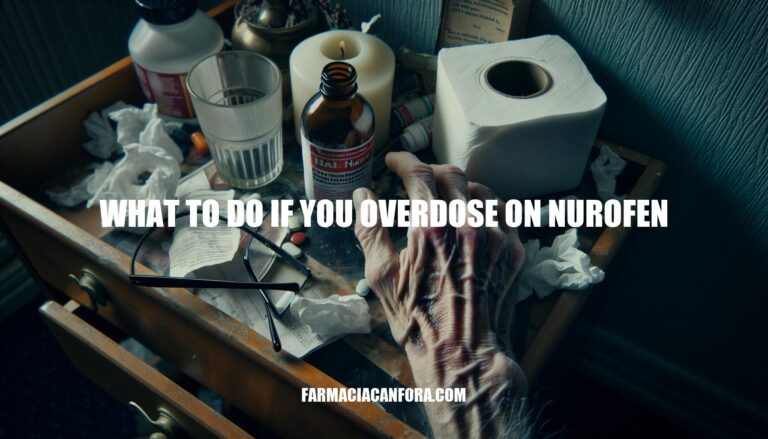overdose“>Nurofen is a brand of ibuprofen, a non-steroidal anti-inflammatory drug (NSAID) commonly used to relieve pain, reduce inflammation, and lower fever. It’s important to know what to do in case of an overdose because taking too much Nurofen can lead to serious health issues like stomach bleeding, kidney damage, and even life-threatening complications. If you suspect an overdose, seek medical attention immediately.
Recognizing an Overdose
If you overdose on Nurofen (ibuprofen), watch out for these symptoms:
- Nausea and vomiting (sometimes bloody)
- Stomach pain and possible bleeding
- Diarrhea
- Ringing in the ears
- Blurred vision
- Dizziness
- Difficulty breathing
- Seizures
- Coma in severe cases.
If you suspect an overdose, seek medical help immediately.
Immediate Actions
- Stop taking Nurofen immediately.
- Call emergency services (112 in Latvia) and inform them of the overdose.
- Do not induce vomiting unless instructed by a medical professional.
- Stay calm and provide clear information to the operator, including the amount taken and any symptoms.
- Follow any instructions given by the emergency operator.
- If possible, have someone stay with you until help arrives.
- Keep the Nurofen packaging to show medical personnel.
Stay safe and seek help immediately.
Medical Treatment
If you overdose on Nurofen (ibuprofen), medical treatments may include:
- Gastric lavage (stomach pumping) if the overdose is recent.
- Activated charcoal to absorb the drug in the stomach.
- Medications to induce vomiting.
- Intravenous fluids to maintain hydration and support kidney function.
- Benzodiazepines to control seizures if they occur.
- Breathing support such as oxygen or a ventilator if needed.
- Antihypertensive medications to manage high blood pressure.
- Forced diuresis with electrolytes and solutions like glucose and sodium bicarbonate to speed up drug elimination.
If you suspect an overdose, seek emergency medical help immediately.
Prevention Tips
To prevent a Nurofen overdose:
- Follow dosage instructions: Always take the recommended dose on the package or as prescribed by your doctor.
- Use a medication diary: Keep track of when you take each dose to avoid accidental double dosing.
- Store safely: Keep Nurofen out of reach of children and in its original packaging.
- Avoid mixing medications: Check with your doctor before combining Nurofen with other medications.
- Consult a healthcare professional: If unsure about the dosage or if you have underlying health conditions.
Stay safe and take care!
What to Do in Case of a Nurofen Overdose
If you suspect an overdose on Nurofen, stop taking it immediately and call emergency services. Do not induce vomiting unless instructed by a medical professional.
Stay calm and provide clear information to the operator. Follow their instructions and have someone stay with you until help arrives.
Keep the Nurofen packaging for medical personnel.
Treatment Options
Medical treatments may include:
- Gastric lavage
- Activated charcoal
- Medications to induce vomiting
- Intravenous fluids
- Breathing support
- Antihypertensive medications
Prevention is Key
To prevent an overdose, follow dosage instructions, use a medication diary, store Nurofen safely, avoid mixing medications, and consult a healthcare professional if unsure.


